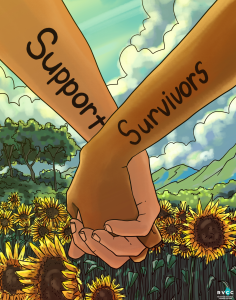Support Someone
Support a Friend
If someone you know has experienced sexual violence, it’s important to provide them with support and resources. Here are some ways to do that:
- Believe them: Let the survivor know that you believe them and support them. Remind them that you care and they are not alone.
- Listen: Give the survivor a safe space to talk about their experience.
- Offer resources: Connect them with support services, such as the Merced College campus advocate or Valley Crisis Center. If you aren’t sure where to start, there is information on the Get Help section of the RSVP Program website. You may also wish to review reporting options (PDF) with your friend.
- Keep it confidential: Your friend has chosen to tell you something that they may not wish to be revealed to others. Honor that and don’t tell anyone without your friend’s permission. If you are worried about your friend talk to them about resources available to help.
- Let them make their own decisions: You can provide options and information and always let your friend make their own decisions. A person who has been assaulted or abused has been disempowered by another person, and it may be important in their recovery to practice control over their own decisions. Instead of taking charge, ask how you can help. Offer to accompany your friend to seek any services that they choose to use.
- Seek support for yourself. Talking with someone can help you work through your own feelings and can better enable you to support your friend.
Valley Crisis 24/7 Hotline (209) 722-HELP (4357)
Support a Student: Guidance for Faculty and Staff
PDF: “Compassionate Connections: Guidance for Faculty”
Faculty and staff are not confidential resources. This means that you may be required to report any incidences and/or reports of sexual assault, domestic violence, dating violence, or stalking to the Merced College Title IX Coordinator.
If a student is disclosing an experience of sexual violence to you, they likely consider you a trusted advisor – but it is important that you let them know upfront that you are not a confidential resource. If you sense a student is about to disclose something, you may say:
“Thank you for trusting me. I want to let you know that I am not a confidential resource, which means that I may need to share anything you tell me about an experience of misconduct with the Title IX Coordinator. I can let you know who the confidential resources on campus are, as well as other options for advice and support. I want you to make a choice about whom you feel comfortable sharing with.”
You may then wish to review the Get Help section with your student, which outlines free, confidential support resources both on and off campus. A confidential resource is someone who is not obligated to notify the police or campus authorities. You may wish to let the student know that an advocate is available on campus, 24-hours per week, in LRC 205. The advocate can be reached at [email protected] or 209.756.6446.
The resource “Compassionate Connections: Guidance for Faculty” (PDF) is a useful script for speaking with your student in a survivor-centered way. Copies of this resource are available from the RSVP program.
If a student still decides to disclose a Title IX violation with you, please contact the Title IX Coordinator. The Title IX Coordinator will first ensure the student’s safety, then offer supportive measures. Please note that the Title IX Coordinator will not involve the police without the survivor’s consent unless there is an immediate risk to the campus community.
More information about Title IX and reporting policies can be found on the Human Resources Department’s Title IX page.
If you have questions about your obligations to report, would like to discuss options, or if you become aware of a potential Title IX violation please contact:
Kelly Avila, Vice President of Human Resources
Merced College Administration Building, Office of Human Resources
3600 M Street Merced CA 95348
(209) 384-6102
[email protected]
